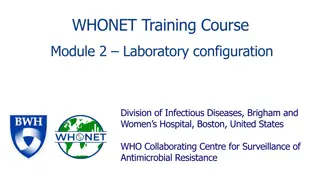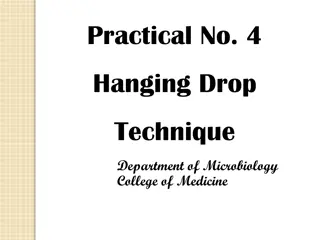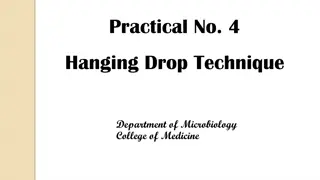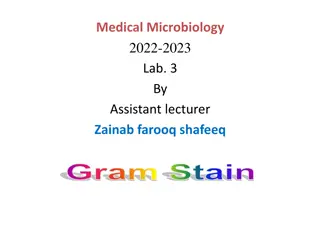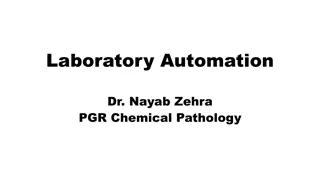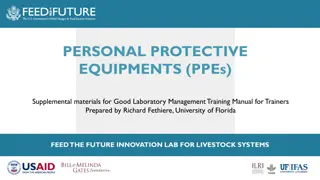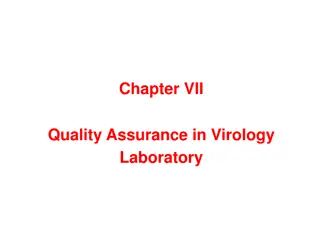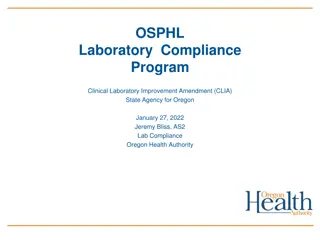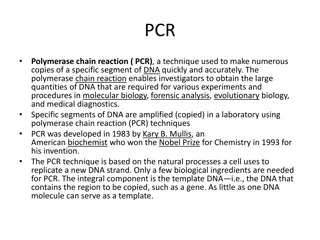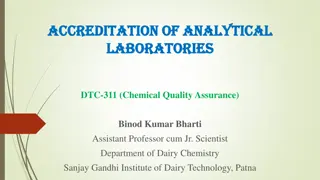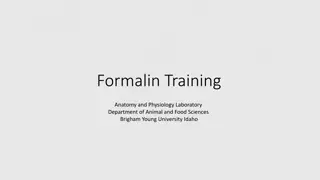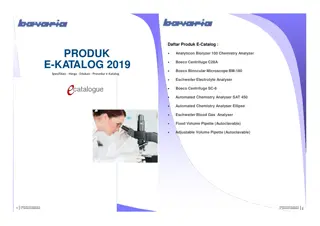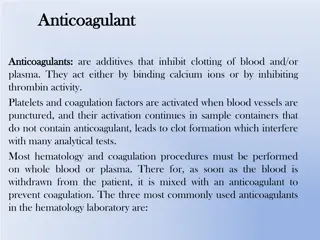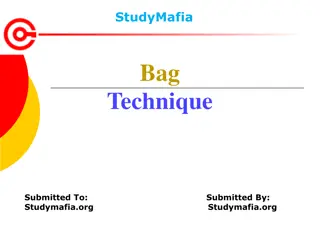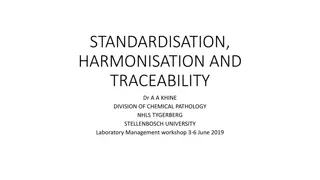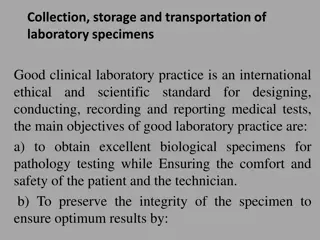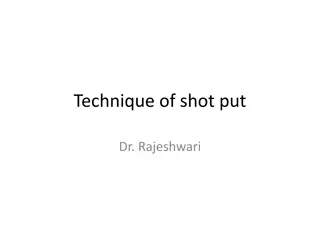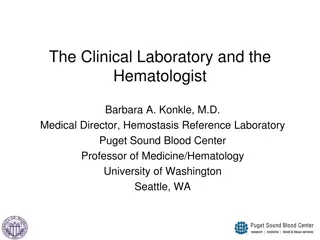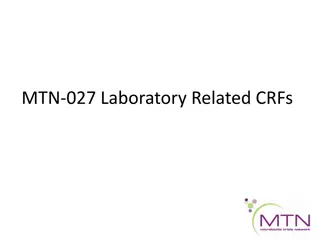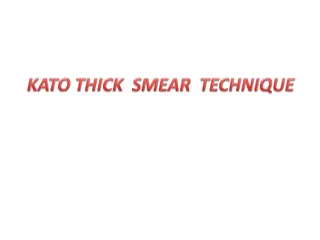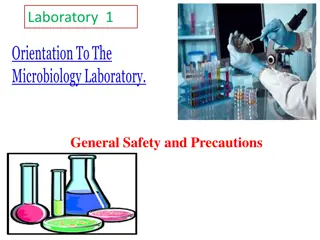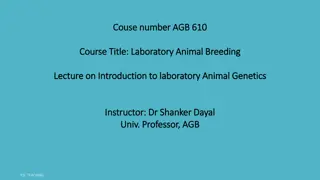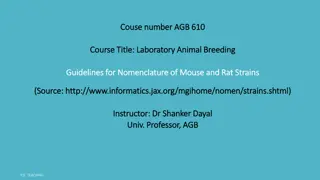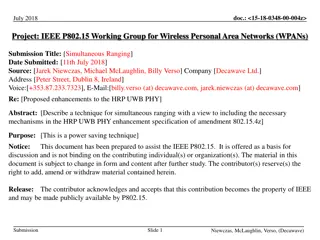History and Educational Programs of DEU Lab Animal Science Department
Established in 2004, the Department of Laboratory Animal Science at Dokuz Eylul University Institute of Health Sciences offers cutting-edge education focusing on animal welfare and ethical practices in scientific research. The department upholds the 3R Principle—Reduction, Refinement, Replacement�
0 views • 9 slides
Laboratory Material Quality Management Procedures
This detailed guide covers the comprehensive process management and quality control procedures for laboratory materials, including the life cycle of materials, purchase processes, vendor evaluation, reception and storage guidelines, and evaluation criteria. It emphasizes the importance of documented
1 views • 20 slides
Effective Laboratory Management: Safety, Equipment Maintenance, and Inventory Control
This comprehensive training manual covers essential topics such as laboratory safety, equipment maintenance, supplies and reagents inventory, chemical inventory management, and material safety data sheets. It emphasizes the importance of proper procedures to ensure a safe working environment and eff
1 views • 19 slides
Optimizing Laboratory Billing Services, The Key to Efficient Healthcare Revenue Management
In the intricate web of healthcare management, laboratory billing services play a pivotal role. From accurately documenting procedures to ensuring compliance with complex insurance regulations, effective billing is essential for the financial health of laboratories and the overall healthcare system.
2 views • 8 slides
WHONET Training Course: Laboratory Configuration and Setup
Understanding the laboratory configuration process in WHONET is crucial for effective data entry and analysis. This module guides users on setting up a new laboratory, entering country and lab details, defining antibiotics, sample locations, and data fields, creating microbiological alerts, and savi
3 views • 57 slides
Streamlining Laboratory Billing Services, Key Benefits and Best Practices
In the fast-paced environment of medical laboratories, accurate and efficient billing processes are essential. Laboratory billing services are crucial in ensuring financial stability and compliance with healthcare regulations. This blog explores the benefits of professional laboratory billing servic
1 views • 7 slides
Enhancing Laboratory Billing Services with MedKarma, A Comprehensive Guide
In the dynamic healthcare landscape, laboratory billing services play a crucial role in ensuring smooth financial operations for medical laboratories. Effective billing practices not only streamline revenue cycles but also enhance overall operational efficiency. MedKarma, a leading provider of labor
2 views • 7 slides
Revolutionizing Laboratory Billing Services with Medkarma, Precision, Efficiency, and Transparency
In the ever-evolving healthcare landscape, laboratory billing services stand as a critical component in ensuring the financial health of diagnostic labs. The complexity of billing processes, coupled with stringent compliance requirements, demands a specialized approach. Medkarma, a leader in healthc
1 views • 7 slides
Introduction to Hanging Drop Technique in Microbiology
The hanging drop technique is a method used in microbiology to observe living microorganisms suspended in a fluid under a microscope. This technique allows for the examination of motility and morphology of bacteria, providing valuable information for research and analysis. By creating a wet mount us
0 views • 17 slides
Microbiology Study: Hanging Drop Technique in Department of Microbiology, College of Medicine
In the Department of Microbiology at the College of Medicine, the Hanging Drop Technique is utilized to study live microorganisms. This technique involves suspending microorganisms in fluid on a hollow ground slide, allowing for observation of their morphology under a microscope. By creating a wet m
0 views • 8 slides
Mastering the Long Jump Technique with Dr. Rajeshwari
The long jump, a combination of speed, technique, and precision, is more than just the jump itself. Dr. Rajeshwari explains the key elements such as setting up the approach, drive and transition phases, as well as the attack phase and final steps to excel in this track and field event. Learn from th
0 views • 10 slides
Understanding the Gram Stain Technique in Medical Microbiology Lab
The Gram stain is a crucial technique in bacteriology, dividing bacteria into Gram-positive and Gram-negative groups based on cell wall characteristics. This method involves using crystal violet, iodine, ethanol, and safranin to differentiate between the two types of bacteria. Gram-positive bacteria
0 views • 11 slides
Laboratory Automation in Chemical Pathology: A Comprehensive Overview
Laboratory automation in chemical pathology involves the use of control systems to minimize human intervention and improve efficiency in conducting tests. The historical background, types of automation, benefits, total laboratory automation, and important considerations are discussed in detail.
1 views • 25 slides
Best Practices for Laboratory Safety and Management
Promoting a safe laboratory environment involves following safety codes and assigning responsibilities for practices like hazard awareness, equipment use, and PPE. Good laboratory practices include proper storage and handling of hazardous chemicals, with a focus on flammable, corrosive, reactive, an
3 views • 17 slides
Quality Assurance in Virology Laboratory
This chapter focuses on quality assurance in virology laboratory, covering topics such as quality control, documentation of test results, laboratory safety rules, and more. It explains the types of quality control, quality assurance cycle, and process areas of quality assurance in laboratory testing
3 views • 19 slides
Understanding CLIA: Ensuring Quality Laboratory Testing in Oregon
Describing the Clinical Laboratory Improvement Amendments (CLIA) program in Oregon, focusing on sustainable compliance for quality laboratory testing. Explains the purpose of CLIA, types of certifications, and requirements for laboratories. Highlights the role of the Oregon State Agency in administe
0 views • 13 slides
PCR and Blot Techniques in Molecular Biology
Polymerase Chain Reaction (PCR) is a crucial technique for amplifying specific DNA segments rapidly and accurately. Developed in 1983, PCR is widely used in various fields such as molecular biology, forensics, evolution, and medical diagnostics. On the other hand, the Blot technique transfers DNA, R
0 views • 10 slides
Understanding Laboratory Accreditation of Analytical Laboratories
Laboratory accreditation ensures third-party certification of testing and calibration competence, providing formal recognition to laboratories. This accreditation allows customers to identify reliable services and ensures laboratories maintain technical competence. Accreditation bodies use specific
1 views • 20 slides
Formalin Safety Guidelines in Anatomy and Physiology Laboratory
Formalin, a mixture of formaldehyde and water, is used in laboratories to preserve tissues. OSHA regulates exposure levels due to health risks. Proper ventilation and personal protective equipment are crucial to control exposure. The laboratory employs engineering controls and monitoring for safety.
0 views • 16 slides
Laboratory Equipment E-Catalog 2019
Explore the E-Catalog featuring various laboratory equipment such as the Analyticon Biolyzer 100 Chemistry Analyzer, Boeco Centrifuge C28A, and Eschweiler Blood Gas Analyzer. View specifications, prices, education materials, and procedures for these advanced laboratory tools. The catalog includes es
2 views • 7 slides
Utilizing Sterile Insect Technique for Aedes Aegypti Control
The Sterile Insect Technique (SIT) is a biologically-based method used to manage key insect pests by releasing sterile insects to decrease population reproduction. This technique, developed through genetic manipulation and ionizing radiation, has been instrumental in controlling insect populations l
0 views • 13 slides
Understanding Anticoagulants in Laboratory Hematology
Anticoagulants are crucial additives that prevent blood clotting during laboratory procedures. The commonly used anticoagulants include EDTA, sodium citrate, and heparin, each with specific concentrations, modes of action, and color-coded identifications. EDTA is ideal for blood cell counts, sodium
0 views • 6 slides
Urban Design Techniques for City Improvement
Urban design techniques play a crucial role in urban improvement by providing concepts and tools for city building. Some of these techniques include the Open Space Technique, Transportation System Technique, Capital Network Technique, Public Policies Technique, Physical Design Technique, Plug-in Tec
1 views • 11 slides
Efficient Nursing Care with Bag Technique: Principles, Considerations, and Steps
Learn about the Bag Technique in nursing, a method utilizing a public health bag to perform procedures during home visits efficiently and effectively. Explore the principles, considerations, and steps involved in implementing this technique to minimize infection spread and ensure optimal patient car
0 views • 21 slides
Achieving Comparable Results in Laboratory Practice
Good laboratory practice necessitates minimal error in measurement to reflect a patient's biological condition accurately, ensuring comparable and reliable results regardless of testing location or method. Standardization, harmonization, and traceability play crucial roles in achieving uniformity an
0 views • 29 slides
Best Practices for Clinical Laboratory Specimen Handling
Good clinical laboratory practice emphasizes the proper collection, storage, and transportation of laboratory specimens to ensure accurate and reliable test results. Key aspects include obtaining high-quality specimens, maintaining specimen integrity, and following standard precautions to prevent co
6 views • 6 slides
Shot Put Technique Overview
Shot put technique involves specific steps from holding the shot correctly to the final throwing position. It includes holding the shot at the base of the fingers, raising it above the head, positioning the body correctly, and executing the throw with a focus on using the legs and hips effectively f
0 views • 8 slides
Understanding the Courts' Perspective on the Reid Technique
The Courts' view on the Reid Technique emphasizes following established guidelines, avoiding coercion, and treating subjects with respect. They caution against making promises or threats, denying rights, or conducting excessively long interrogations. The core principles include conducting interviews
0 views • 89 slides
Insights into Hematology Laboratory Practice
This resource explores the potential role of hematologists in laboratory settings, discussing board certification, advantages, challenges, current training trends, and core curriculum lectures in hematology. It sheds light on the critical areas of laboratory training, emphasizing the importance of u
0 views • 9 slides
Laboratory Related CRFs for Pharmacokinetics Study
This collection encompasses various CRFs related to laboratory procedures in the context of Pharmacokinetics for a study. It includes forms for enrollment, specimen storage, safety laboratory results, and specific days for sample collection. The CRFs detail the storage, collection, and documentation
0 views • 14 slides
Insights into the Kato and Miura Thick Smear Technique
In 1954, Kato and Miura introduced the cellophane thick-smear technique for direct fecal sampling, revolutionizing helminthic infection detection. This method evolved into the Kato-Katz technique, providing advantages like precise egg quantification but facing challenges with hookworm egg visualizat
0 views • 19 slides
Exploring Alpha Cluster Structure in Nuclei Using Thick Target Inverse Kinematics Technique
Exploring the alpha cluster structure of nuclei through the thick target inverse kinematics technique for multiple alpha decays. This study investigates alpha clustering in nuclei, potential alpha condensates, and the application of the inverse kinematics technique in detecting multiple alpha emissi
0 views • 14 slides
Impulse Excitation Technique for Monitoring Green Ceramics During Firing
The Impulse Excitation Technique (IET) is a nondestructive testing method employed to monitor the elastic properties of green ceramics as they undergo firing processes. This technique allows for the analysis of phase changes and material behavior at high temperatures, providing valuable insights int
0 views • 6 slides
Innovative Weed Control Technique for Commercial Pineapple Cultivation
This research proposal focuses on developing a cost-effective technique to control weeds in commercial pineapple cultivations to improve yields and income for farmers. The introduction provides insights into the current status of pineapple cultivation in Sri Lanka, highlighting the challenges faced
0 views • 15 slides
Laboratory General Safety and Precautions
Microbiology involves the study of microorganisms such as bacteria, fungi, viruses, and parasites. It is crucial to maintain strict safety protocols in the laboratory to prevent contamination and ensure the well-being of individuals handling these potentially pathogenic organisms. Rules like wearing
0 views • 26 slides
Understanding Laboratory Animal Genetics and Research Importance
This course (AGB 610) delves into the realm of laboratory animal breeding, exploring the significance of using animals in research and teaching. Dr Shanker Dayal, a distinguished professor, guides students through lectures on animal genetics and the common uses of laboratory animals. The course emph
0 views • 14 slides
Improve Your Swimming Technique with These Tips
Enhance your swimming technique with valuable tips from Atlantic Masters. Learn how to swim more efficiently and faster by adjusting your technique to fit your goals and flexibility. Explore techniques like Early Vertical Forearm, Full Stroke with No Early Exit, Breathing When and How, and overcomin
0 views • 8 slides
Exploring the Role and Objectives of Laboratory Teaching
The content delves into the various perspectives on laboratory teaching, its aims, pedagogical levels, and common challenges faced. It discusses specific aims of laboratory teaching, including familiarization with equipment, teaching experimental work attitudes, and training in observation and deduc
0 views • 32 slides
Guidelines for Nomenclature of Laboratory Mouse and Rat Strains
Laboratory mice and rat strains have specific nomenclature guidelines to account for their genetic backgrounds and origins. Mouse strains are registered through the Mouse Genome Database, while rat strains are registered through the Rat Genome Database. The use of Laboratory Registration Codes is cr
0 views • 14 slides
Enhancing HRP UWB PHY through Simultaneous Ranging Technique
This document discusses a power-saving technique known as simultaneous ranging, proposed for inclusion in the IEEE P802.15.4z standard amendment. The technique allows for efficient distance measurement in scenarios such as automotive applications by configuring multiple devices to respond simultaneo
0 views • 16 slides




